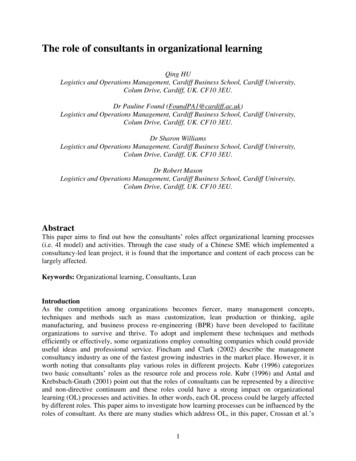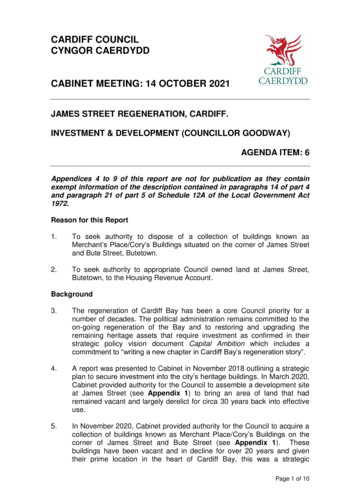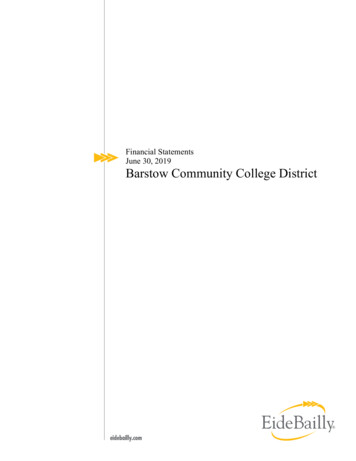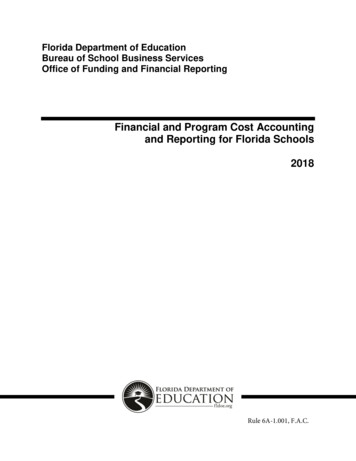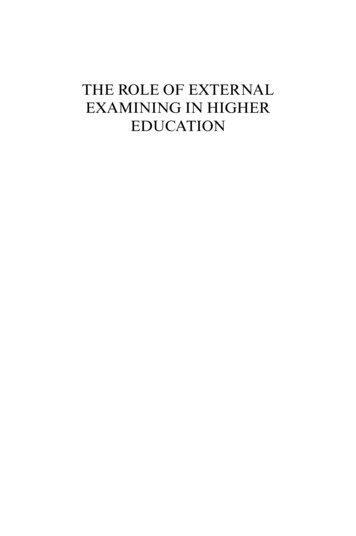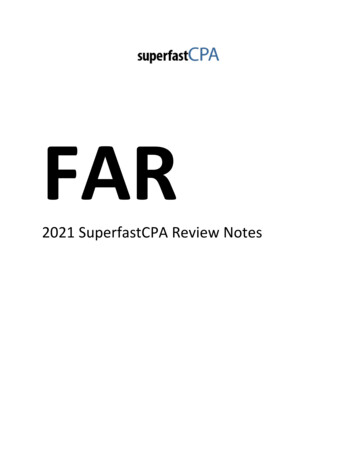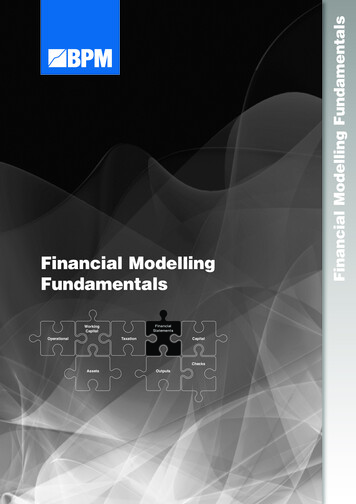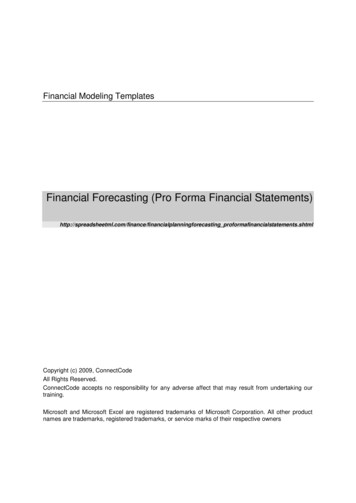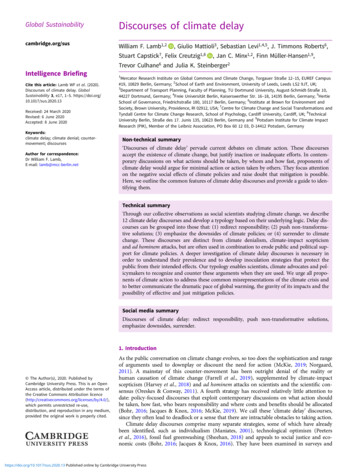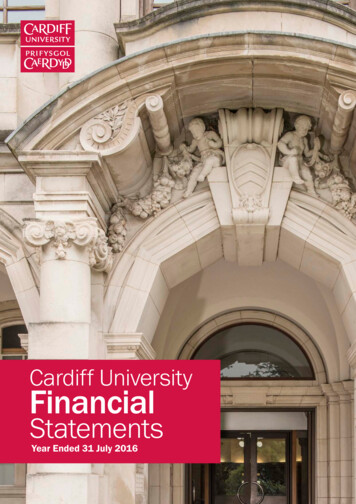
Transcription
Cardiff UniversityFinancialStatementsYear Ended 31 July 2016
imagesFront cover: Cardiff University Main Building entranceThis page: Cardiff University Brain Research Imaging CentreBack cover: Gravitational wave - The detection of gravitational waves, made by Professor Sathyaprakash and the LIGOcollaboration has been hailed as one of the greatest scientific discoveries of the decade
Cardiff UniversityFinancial StatementsYear Ended 31 July 2016ContentsReference and Administrative Information2Strategic Report3Corporate Governance Statement7Public Benefit Statement8Responsibilities of the Council of Cardiff University9Independent Auditors’ Report10Consolidated Statement of Comprehensive Income13Statements of Changes in Reserves14Balance Sheets15Consolidated Statement of Cash Flows16Notes to the Financial Statements17Charity Registration Number: 1136855www.cardiff.ac.uk1
Reference andAdministrative InformationCharity Name:Cardiff UniversityCharity Registration Number: 1136855Registered Office:Main BuildingCathays ParkCardiffCF10 3ATMembers of CouncilChair:Mr D John Jeans [resigned 31 December 2015, replaced by Professor Stuart Palmer 1 January 2016]Vice Chair:Dr G Treharne [resigned 31 July 2016, replaced by Rev Gareth Powell]Vice-Chancellor:Professor C RiordanDeputy Vice-Chancellor:Professor E TreasureCouncil Members:Mr R AggarwalMrs M BattleMs S TimbersMr G Clarke [resigned 31 July 2016, replaced by Judge Ray Singh]Mr R Calil [resigned 31 July 2016, replaced by Robert Lewis-Watkin]Mr M LeighfieldMs R WilliamsProfessor G BoyneDr C BellMr A GibbonsMrs S Gwyer-Roberts [resigned 31 July 2016, replaced by Ms Jan Juillerat]Ms C Blakeway [resigned 30 June 2016, replaced by Mr M Hanafy]Professor S Palmer [Chair from 1 January 2016]Ms L PhillipsThe Reverend G Powell [Vice-Chair from 1 August 2016]Mr R PreeceProfessor P Price [resigned 31 July 2016, replaced by Professor Paul Milbourne]Mr D SimpsonProfessor N De LeeuwDr S LukeMr R LeachProfessor A CoffeyMs N Richards [appointed 29 February 2016]All of those persons listed above served as Charity Trustees throughout the period covered by this Report.Unless otherwise indicated they also occupied these positions on the date on which the Report was approved.2
Strategic ReportIntroductionResults for the YearThe past year has been very industrious for the University ascapital developments continued at pace throughout the yearand a successful bond issue brought in 300m to financethe University’s capital investment plans at a very favourablerate.The surplus for the year was in line with expectations.Her Majesty the Queen opened the new 44m CardiffUniversity Brain Imaging Centre (CUBRIC) in June 2016,which houses Europe’s most powerful brain scanner. ThisCentre has helped cement Cardiff University’s position asone of the UK’s top three for Neuroimaging, Psychology andPsychiatryDevelopments have progressed for other landmark buildingson the Innovation Campus and elsewhere in the University,such as the Centre for Student Life on the Cathays Parkcampus. A 38m five-year refurbishment of learning andteaching spaces is also progressing well.The introduction of the new Statement of RecommendedPractice (SORP) for FE and HE Institutions has led to morevolatility into the results of universities. Income is no longerconsistently matched to expenditure in the same way andcapital grants are no longer deferred and released in line withdepreciation.Net assets have also been bolstered by the introduction ofthe SORP. The Land and Buildings of the University havebeen revalued adding 275m to the University’s net assetvalue. This more than offsets the major change to liabilitiesas the provision introduced to estimate the cost of futurepayments that will be required to fund the University’s shareof the deficit in the USS Pension Scheme now stands at 50m.The University’s stated goal is to be a top 100 worlduniversity and it is envisaged that these developments willhelp achieve that. More importantly, the investment willsupport the University’s goals of providing excellent researchand teaching in facilities that are comparable to the best inthe country.While the University is enacting its plans before an externalbackdrop of public spending cuts and the fall-out from theresult of the referendum on Europe, it is doing so from aposition of financial strength. The Financial Statementssuggest that it is well placed to make the necessaryinvestment to ensure it is attuned to the needs of a modern,global university. Year-on-year surpluses have been securedand the University is working hard to increase its incomefrom research grants and students.Scope of the Financial StatementsThe financial statements for the year ended 31 July 2016consolidate the results of the University, its subsidiarycompany University College Cardiff Consultants Limited andthe joint ventures Compound Semiconductors Limited andCardiff Medicentre Limited.3
Strategic ReportIncome Growth 6%Income has continued to grow with increases of 18min tuition fees and 6m in research income. The HigherEducation Funding Council for Wales (HEFCW) recurrent grantis static whilst 10m of capital grants have been recognisedduring the year due to the new financial reporting standardpreventing deferral to match against future depreciation.The increased student fee income is mainly due to home fulltime undergraduate fees.The research income includes 1.2m (2015 9.8m) ofResearch and Development Expenditure Credits (RDEC) fromHM Revenue and Customs. The taxation figure relates entirelyto tax paid on these credits giving a net non-recurring sourceof income of 0.9m (2015 7.6m) for the year. The othersignificant movement is in income from Research Councilswhich has grown from 26m to 37m.Expenditure Increase 1%The majority of spend is incurred in the areas of teachingand research which together represent 60% of totalexpenditure.Research revenue expenditure decreased by 6m in theyear but was more than replaced by a greater proportion ofresearch income spent on capital items. This was mainly dueto funding received for large projects including CUBRIC2 andthe Musculoskeletal Research Centre.The depreciation charge has increased by 5m in the yearwhich reflects the increase in capital investment.Pension fund adjustments within expenditure were lowerthis year with the USS liability increase at 6m comparedto 25m in 2014/15. There was a gain of 3.0m includedwithin staff costs partially offset by a loss of 2.1m oninterest within other costs as a result of pension-relatedcosts. However, the actuarial losses on pension schemesfurther down the Statement of Consolidated Income andExpenditure were significant, contributing a further increaseof 21.3m to the pension provision in the Balance Sheet.Further information is provided on this in the accountingpolicies note and notes 20 and 22.4
Strategic ReportKey Financial Performance Indicatorsin line with Russell GroupThe University monitors its key financial performanceindicators and compares these against the Russell Group ofresearch led universities in the UK.The latest available information relating to Russell Groupuniversities indicates that Cardiff’s ratios are broadly in linewith its comparators as outlined in the table.Capital InvestmentDuring the year 69m was spent on investment ininfrastructure and equipment. This was funded from thecash surplus generated in the year, 20m of capital grantsplus the use of existing reserves within the UniversityOf this total 33m was invested in building projects. Theaforementioned CUBRIC2 building on the Maindy Roadcampus was completed in the year and many existingbuildings were refurbished in line with the EstatesMasterplan, which aims to provide state-of-the-art research,teaching and student facilities. A further 36m was investedin new equipment and systems which included the CUBRIC2 scanners, equipment for a new Musculoskeletal ResearchFacility and equipment for the new Ser Cymru funded Chairsand University Research Institutes.Compound Semiconductor CentreLimitedCashflow Surplus 5%In addition to the KPIs above, the Way Forward strategy aimsfor a minimum cashflow surplus of 5% of income each yearto fund its ambitious investment programme. The net cashinflow from operating activities for 2015/16 of 48m isadjusted for capital grants of 20m (HEFCW 10m; ResearchGrants 10m) to give a surplus of 28m which represents5% of income.A further 15.2 million was invested in this new joint venturewith IQE Plc during the year bringing the total invested to 21m. The investment is integral to the establishment ofthe Institute for Compound Semiconductors which will bebased in the Translational Research Facility (TRF) on theInnovation Campus. The Institute will provide facilities to helpresearchers and industry work together, positioning Cardiff asthe UK and European leader in compound semiconductors.Cardiff MedicentreCardiff Medicentre is a business incubator for biotech andmedtech startups based on the Heath Park Campus. Asum of 2m was invested during the year in increasing theUniversity’s share in the Cardiff Medicentre joint venture.The University bought out the 66.75% owned by WelshMinisters and Cardiff County Council to increase its stake inthis joint venture to 89%. The remaining 11% remains withCardiff and Vale University Health Board.5
Strategic ReportFuture DevelopmentsWork is planned to commence in early 2017 on two newbuildings for a Translational Research Facility (TRF) andInnovation Central, both sited on the Innovation Campus onMaindy Road in 2016/17 with completion due in September2018. The 72m TRF building will house the Institute forCompound Semiconductors and the Cardiff Catalysis Institute(CCI). The CCI is already established as one of the world’s topfive catalysis research centres and moving to a new buildingwill enable growth across many scientific disciplines. The 46m Innovation Central building will be home to a SocialScience Research Park which aims to provide solutions topressing global problems, and the Innovation Centre whichplans to provide start-up companies with resources andsupport to help them thrive.In addition, a 45m Centre for Student Life building willprovide new state-of-the art teaching and student facilitieson Park Place. The design contract was awarded in October2015 and further tenders are taking place to enablecommencement of this building during the 2017/18academic year with completion due in May 2019.Outlook and Principal RisksThe University is in a very sound financial position to facethe challenges that will affect the higher education sectorover the next few years. All UK universities are exposed tochanges in our relationship with Europe and it remains to beseen what impact the Brexit outcomes will have in terms ofEU students attending UK universities and in terms of thepotential loss of research income. The recent decision byUK and Welsh Governments with regard to 2017 EU studentintake is very positive and hopefully a longer term solutioncan be found as well.In addition to the EU challenge the University, alongside allother UK universities, is exposed to any adverse (or positive)changes to student recruitment from overseas countries.Given the dominance of the Chinese market and the volatilityof oil prices the overseas recruitment market undoubtedlycarries both huge benefits and risks. The University managesthese risks and continually monitors the market to ensure itis well placed to respond to any eventuality.The next few years will see a massive capital programmecome to life with the developments on Maindy Road andthe Centre for Student Life on Park Place expected to becompleted in 2018/19. These developments will significantlyenhance the research capability of the University and providea showcase facility for our students.Financial forecasts for the next few years show a tightbudgetary landscape but still allows reasonable cashsurpluses to be created each year to contribute to our capitalambitions. The recent publication of the Diamond Review onuniversity funding in Wales is a very welcome developmentand if adopted in full by the government will undoubtedlybring financial stability and sustainability to the Welsh HEsector.Professor Stuart PalmerChair of Council28 November 2016imageHer Majesty Queen Elizabeth accompanied by ViceChancellor Professor Colin Riordan at the opening ofthe Cardiff University Brain Research Imaging Centre6
Corporate GovernanceStatementThe University is committed to exhibiting best practicein all aspects of corporate governance. It endeavours toconduct its business in accordance with the seven principlesidentified by the Committee on Standards in Public Life,namely selflessness, integrity, objectivity, accountability,openness, honesty and leadership, in accordance withthe guidance provided to universities by the Committee ofUniversity Chairs. This summary is provided to help thereader of the Financial Statements understand how theprinciples have been applied.The Council is responsible for the University’s system ofinternal control and for reviewing its effectiveness. Such asystem is designed to manage rather than eliminate the riskof failure to achieve business objectives and can only providereasonable and not absolute assurance against materialmisstatement or loss.The University has a framework for risk management and arisk management policy which incorporates recommendedbest practice. A corporate strategic risk register has beendeveloped, based upon the University’s strategic prioritiesand risks identified by Colleges and Professional ServicesLeadership Team. Council, through the Audit Committee,receives regular reports on internal control and complianceacross the University; the internal audit programme is basedon an assessment of areas of priority and risk using the newframework and the strategic priorities identified in The WayForward.In line with the Committee of University Chairmen’s Guide,the Council receives a report which updates progress towardsthe University’s key strategic outcomes and objectives andalso undertakes an annual review of the effectiveness of theCouncil.The University’s Council meets five times a year andhas several committees, including Policy and ResourcesCommittee, a Governance Committee, a RemunerationCommittee and an Audit Committee. All of these Committeesare formally constituted with terms of reference.The Policy and Resources Committee manages, monitorsand regulates the finances, accounts and investments of theUniversity within the overall policy laid down by the Council.The Governance Committee advises Council on mattersrelating to governance and on the level of compliance by theUniversity with the mandatory requirements of legislation andother regulations. Furthermore, the Governance Committeeseeks out and recommends new lay and co-opted membersto serve on the Council itself, and its sub-committees, in thelight of the optimum skills and competencies required. Laymembers form the majority of Council members.The Remuneration Committee determines the remunerationof the most senior staff, including the Vice-Chancellor.The Audit Committee met five times in 2015-16, includinga special meeting of the Committee in January 2016to consider the restated Financial Statements requiredfor its fund-raising activities. The University’s internalauditors attended all meetings except the January 2016meeting. The external auditors were present for the specialmeeting in January 2016 and for consideration of theannual Financial Statements and management letter aswell as the annual audit plan. The Committee considersdetailed reports together with recommendations for theimprovement of the University’s systems of internal controlas well as management responses and implementationplans. It also receives and considers reports from HEFCW,the Wales Audit Office and Research Councils UK as theyaffect the University’s business and monitors adherence tothe regulatory requirements. The Vice-Chancellor and othersenior executives are not members of the Committee andmay attend meetings by invitation.In the preparation of this statement the Council of theUniversity has had regard for the guidance issued by theCharity Commission.In respect of its strategic and development responsibilities,the Council receives recommendations and advice fromthe Policy and Resources Committee which is a standingcommittee of the Council, and from the Senate, the bodyresponsible for the University’s academic affairs.7
Public BenefitStatementCardiff University is a registered charity (no 1136855).Its Royal Charter, first granted in 1884, sets out itsconstitutional arrangements and its objects. Embodiedwithin the objects are such fundamental principles as theadvancement of education, including the University’s powerto conduct research, to teach, examine, and award degrees.They also contain obligations to develop the character of thestudents, to promote health and welfare, especially in Walesand generally to contribute to social, cultural and economicdevelopment. The University is a member of the group ofresearch intensive universities, the Russell Group, and existsto create and share knowledge and to educate for the benefitof all. Cardiff University sees fundamental research bothas an essential to human aspiration and as critical to thedevelopment of cultural artefacts, technologies and servicesto improve the quality of life for all. Its research reputation isone of the principal factors in staff and student recruitment.The University’s strategic aims are set out in ‘The WayForward 2012 – 2017’ and are summarised below.Research and InnovationCardiff’s aim is to be firmly positioned in the top ten UKuniversities. Through its research, which includes theestablishment of a number of University research institutes,the University will tackle critical global issues that requirecross disciplinary co-operation. It is also establishingitself as an Innovation University that acts as a magnetfor participants and for funding whilst reinforcing our civicresponsibilities. In this way we are equipping our graduateswith entrepreneurial capacity so that they can contributeto the growth of the knowledge economy. We will ensurethat our research has global impact by tackling the grandchallenges of our time.EducationThe University educates our students to the higheststandards and supports them through the transition toindependent learning. The student experience is basedon excellence where students actively participate in theirlearning experience and benefit from an environment oftop quality research and scholarship. We are increasing theemployability of our students by investing in the “Languagesfor All” and “Welsh for All” programmes and by offeringincreased opportunities, through the Global OpportunitiesCentre, to students to spend time overseas whether in studyor as volunteers.The University’s students are drawn from a variety ofbackgrounds, with students attracted from throughout Wales,the rest of the UK and worldwide and supported by a range oftargeted scholarships and bursaries to ensure fair access forall. In 2015/16 we invested 7.4 million in scholarships andbursaries.InternationalThe University’s international activities range from ourcollaborations with business and education partners all overthe world to the enormous contribution that internationalstudents make to the social and cultural life of the University.Cardiff also attracts the highest calibre of researchers fromaround the world. International students are welcomed from100 different countries and account for some 18% of thetotal student population.EngagementThe University demonstrates its commitment to thecommunities of Cardiff and Wales through knowledgeexchange projects that directly and indirectly help those whodo not traditionally engage with the University. One exampleis the Strong Communities, Healthier People project whichworks directly with people in Merthyr Tydfil and Cardiff. Wealso welcome the public at many of our events and activities,The University’s students continue in their thousands tosupport local community projects and activities throughStudent Volunteering Cardiff.Promoting health and welfare is an important role of theUniversity and one which is fulfilled via a strongly interdisciplinary and multi-partnership approach. Central amongthe University’s partners are the University Health Boards inWales who provide not only clinical training for students butalso are essential collaborators in conducting clinically basedresearch.imagePharma Bees: The University is working with theNational Botanic Garden of Wales to identifyplant-derived drugs which could be used to treatantibiotic resistant hospital pathogens8As a major presence within Cardiff, both as employer andeducator, the University’s relationship with the City is alsoparticularly important and it is committed to maintaining andfurther developing a mutually beneficial relationship with thecommunity of which we are such an important and integralpart.
Responsibilities of theCouncil of Cardiff UniversityIn accordance with the University’s Charter of Incorporation,the Council is responsible for the administration andmanagement of the affairs of the University, includingensuring an effective system of internal control, and isrequired to present audited Financial Statements for eachfinancial year. The Council is responsible for preparing theFinancial Statements in accordance with applicable law andregulations.The law applicable to the University requires the Council toprepare financial statements for each financial year. Underthat law the Board of Trustees has prepared the financialstatements in accordance with United Kingdom GenerallyAccepted Accounting Practice (United Kingdom AccountingStandards and applicable law). Under that law the Councilmust not approve the financial statements unless it issatisfied that they give a true and fair view of the state ofaffairs of the University and the consolidated group andof the incoming and expenditure of the University and theconsolidated group for that period.In preparing these Financial Statements, the Council isrequired to: select suitable accounting policies and then apply themconsistently; observe the methods and principles in the Statementof Recommended Practice: Accounting for Further andHigher Education; make judgements and estimates that are reasonable andprudent; state whether applicable UK Accounting Standardshave been followed, subject to any material departuresdisclosed and explained in the financial statements; and prepare the financial statements on the going concernbasis unless it is inappropriate to presume that theUniversity will continue in business.The Council is responsible for keeping proper accountingrecords which disclose with reasonable accuracy at anytime the consolidated and University financial position andto enable it to ensure that the Financial Statements areprepared in accordance with the University’s Charter ofIncorporation, the Accounts Direction issued by HEFCW,the Statement of Recommended Practice: Accounting forFurther and Higher Education Institutions and other relevantaccounting standards.In addition, within the terms and conditions of a FinancialMemorandum agreed between HEFCW and the Council of theUniversity, the Council, through its designated office holder,is required to prepare Financial Statements for each financialyear which give a true and fair view of the state of affairsof the University and its subsidiaries and of the surplus ordeficit, statement of movements on reserves and cash flowsfor that year.The Council has taken reasonable steps to: ensure that funds from HEFCW, Welsh Government andother Funding Bodies are used only for the purposesfor which they have been given and in accordance withthe Financial Memorandum with HEFCW and any otherconditions which HEFCW or Funding Body may from timeto time prescribe; ensure that there are appropriate financial andmanagement controls in place to safeguard public fundsand funds from other sources; safeguard the assets of the University and its subsidiariesand prevent and detect fraud; secure the economical, efficient and effectivemanagement of the resources and expenditure of theUniversity and its subsidiaries.The key elements of the University’s system of internalfinancial control, which is designed to discharge theresponsibilities set out above, include the following: clear definitions of the responsibilities of, and theauthority delegated to, heads of academic schools andadministrative departments; planning process, supplemented by detailed annualincome, expenditure, capital and cash flow budgets, theoverall budget being approved by the Council; regular reviews of financial results involving variancereporting and updates of forecast outturns; clearly defined and formalised requirements for approvaland control of expenditure; comprehensive Financial Regulations, detailing financialcontrols and procedures, approved by the AuditCommittee and the Council; an Internal Audit team whose annual programme isapproved by the Audit Committee and endorsed by theCouncil.Any system of internal financial control can, however, provideonly reasonable, but not absolute, assurance againstmaterial misstatement or loss.On behalf of the CouncilProfessor Colin RiordanAccounting Officer28 November 20169
Independent Auditor’s Report tothe Governing Body of Cardiff University(the Institution)Report on the financial statementsOur opinionIn our opinion, Cardiff University’s group financial statementsand parent institution financial statements (the “financialstatements”): give a true and fair view of the state of the group’s and theparent institution’s affairs as at 31 July 2016, and of thegroup’s income and expenditure, and cash flows for theyear then ended; have been properly prepared in accordance with UnitedKingdom Generally Accepted Accounting Practice; have been properly prepared in accordance with therequirements of the Statement of Recommended Practice– Accounting for Further and Higher Education; and have been prepared in accordance with the requirementsof section 144 of the Charities Act 2011 and Regulation14 of The Charities (Accounts and Reports) Regulations2008.What we have auditedThe group financial statements and parent institution’sfinancial statements document as a whole (the “FinancialStatements”), which are prepared by Cardiff Universitycomprise:In our opinion, in all material respects: funds from whatever source administered by theInstitution for specific purposes have been properlyapplied to those purposes and managed in accordancewith relevant legislation and any other terms andconditions attached to them; income has been applied in accordance with theinstitution’s articles of government; and funds provided by HEFCW have been applied inaccordance with the financial memorandum and any otherterms and conditions attached to them.Other matters on which we are requiredto report by exceptionSufficiency of accounting records andinformation and explanations receivedUnder the Charities Act 2011 we are required to report to youif, in our opinion: the Balance Sheets for the group and parent institution asat 31 July 2016; sufficient accounting records have not been kept by theparent institution; or the consolidated Statement of Comprehensive Income forthe year then ended; the parent institution financial statements are not inagreement with the accounting records and returns; or the Statements of Changes in Reserves for the group andparent institution for the year then ended; we have not received all the information and explanationswe require for our audit. the consolidated Statement of Cash Flows for the yearthen ended; andWe have no exceptions to report arising from thisresponsibility. the notes to the financial statements, which include asummary of significant accounting policies and otherexplanatory information.Other information in the Annual ReportThe financial reporting framework that has been applied inits preparation of the financial statements is the Statementof Recommended Practice for Further and Higher Education,incorporating United Kingdom Accounting Standards,comprising FRS102 “the Financial Reporting Standardapplicable in the UK and Republic of Ireland”, and applicablelaw (United Kingdom Generally Accepted AccountingPractice).In applying the financial reporting framework, the GoverningBody has made a number of subjective judgements, forexample in respect of significant accounting estimates.In making such estimates, it has made assumptions andconsidered future events.10Opinions on other matters prescribedin the HEFCW Audit Code of Practiceissued under the Further and HigherEducation Act 1992Under the Charities Act 2011 we are required to report to youif, in our opinion, the non-financial information given in theFinancial Statements is inconsistent in any material respectwith the Financial Statements. We have no exceptions toreport arising from this responsibility.Internal ControlUnder the HEFCW Audit Code of Practice issued under theFurther and Higher Education Act 1992 we are requiredto report to you if, in our opinion, the statement of internalcontrol is inconsistent with our knowledge of the parentinstitution and group. We have no exceptions to report arisingfrom this responsibility.
Independent Auditor’s Report to theCouncil of Cardiff University (the Institution)Responsibilities for the financialstatements and the auditOur responsibilities and those of the CouncilAs explained more fully in the statement of Responsibilitiesof the Council of Cardiff University set out on page 9,the Council (who are also trustees for the purposes ofcharity law) are responsible for the preparation of financialstatements which give a true and fair view.Our responsibility is to audit and express an opinion on thefinancial statement
medtech startups based on the Heath Park Campus. A sum of 2m was invested during the year in increasing the University's share in the Cardiff Medicentre joint venture. The University bought out the 66.75% owned by Welsh Ministers and Cardiff County Council to increase its stake in this joint venture to 89%. The remaining 11% remains with
